Did you know British actor Sydney Greenstreet was the inspiration for not one but two comic villains – including the Marvel villain Kingpin, first brought to life on the page by John Romita Sr.?
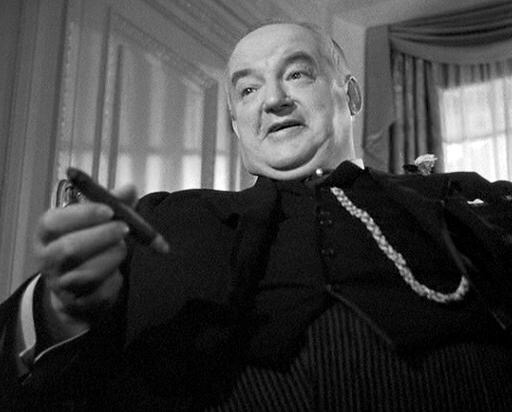
Sydney Greenstreet in The Maltese Falcon
Some of our readers did I expect, but a social media post by comic book historian Alex Grand on Comic Book Historians sent me scurrying downthetubes of the web to find out more, especially given the recent furore over Peter Cushing’s appearance in Star Wars: Rogue One, which has echoes of the way film stars feature or are homaged in both film and other media, often after they’ve died.
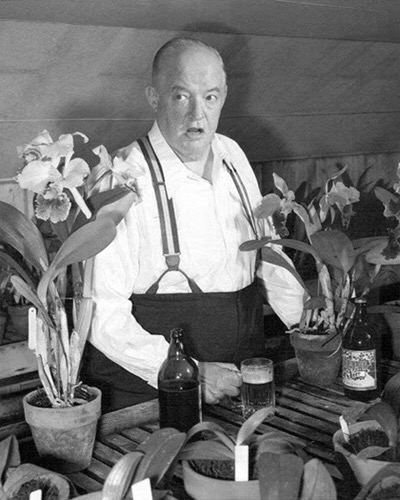
A promotional image of Greenstreet for The New Adventures of Nero Wolfe
(For the record, Peter Cushing’s estate gave permission for his “appearance” in Rogue One, although his revival hasn’t been without controversy – and some mirth).
Greenstreet was primarily a stage actor, working in the US in the 1930s, who didn’t work in film until the age of 62, enjoying a run of notable hits in a Hollywood career lasting just eight years. He began working for Warner Bros. in 1941, debuting as Kasper Gutman (“The Fat Man”) co-starring with Humphrey Bogart in The Maltese Falcon and he went on to star in films such as Casablanca and Passage to Marseille.
During 1950-51, toward the end of his life, Greenstreet played Nero Wolfe on the NBC radio programme, The New Adventures of Nero Wolfe, based loosely on the rotund detective genius created by Rex Stout.
Artist Jack Burnley (the pen name of Hardin J. Burnley), who pencilled the Batman newspaper strip early on, recalled Greenstreet was the visual inspiration for the leader of a band of crooks in the Batman newspaper strip in 1945.
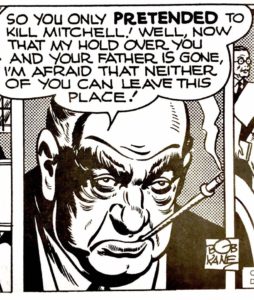
Greenstreet “cast” as a Batman villain for the Batman newspaper strip. Art by Jack Burnley (despite the stylised Bob Kane signature!)
(As a side note, Burnley’s work was often credited to other artists. Regarded as DC’s top ghost artist during his time for the publisher in the 1940s, he was the first artist, after co-creator Joe Shuster, to draw Superman in comic books. He also co-created Starman in 1941, with writer Gardner Fox).
Marvel’s villainous crime lord Kingpin first appeared in The Amazing Spider-Man #50 (July 1967), and was created by writer Stan Lee and artist John Romita, Sr. Former Marvel UK editor Alan Cowsill notes he based his physical appearance on actor Sydney Greenstreet in his book Spider-Man Chronicle: A Year by Year Visual History.
It’s been suggested by some that Doctor Who comic villain Josiah W. Dogbolter, first seen in the Fifth Doctor strip “The Moderator”, written by Steve Parkhouse and drawn by Steve Dillon, was in part inspired by Greenstreet. While we’ve been able to ascertain Dogbolter (voiced by Toby Longworth) was inspired by Greenstreet in the Big Finish Doctor Who adventure The Maltese Penguin, written by Rob Shearman, directed by Gary Russell, we can’t as yet confirm this.
Intriguingly, Greenstreet could have been the basis of another famous Spider-Man villain rather than Kingpin, had Stan Lee got his way. In his essay “A Mini-history” published in January 2002, artist Steve Ditko wrote that Stan Lee wanted him to model the Spider-Man villain the Vulture after Greenstreet, instead of Ditko’s gaunt, lean fast villain that we saw on Amazing Spider-Man #2’s cover.
But Ditko didn’t want him looking like a turkey, so maintained the slim approach.
Jim Steranko did introduce a Greenstreet lookalike in Nick Fury, Agent of S.H.I.E.L.D. #5 (his final issue). The character was called Pickman, a tip of the hat to the Greenstreet’s character Guttman in The Maltese Falcon.
Greenstreet is of course not the only actor (or, indeed, celebrity) to inspire the look of a comic villain. Among others, Bob Kane cited actor Conrad Veidt as in part the inspiration for the look of the Joker, after seeing a photo of him from The Man Who Laughs provided by Jerry Robinson; and according to writer Mark Evanier, who wrote Jack Kirby’s biography Kirby: King of Comics, he based Darkseid appearance on Jack Palance – and his personality on Adolf Hilter!
While putting this article together, I also discovered George Lucas was inspired to model Jabba the Hut after the Sydney Greenstreet. Although, given Peter Cushing’s revival in Rogue One, I suppose I shouldn’t have been that surprised, especially given the many well-documented influences the director drew on when creating the Star Wars mythos inspired by his childhood – film serials and westerns among them.
The production team for Star Wars: Return of the Jedi came up with the ultimate design for Jabba after they were instructed by Lucas to make the character look “alien and grotesque” … just like Sydney Greenstreet.
• Sydney Greenstreet on Wikipedia
• Batman: The Dailies 1943-1946
• Spider-Man: Chronicle Celebrating 50 Years of Web-Slinging by Matthew K. Manning and Alan Cowsill
• Screenrant: Some of the Real-Life inspirations behind some of the best comic book villains
With thanks to Alex Grand at the Facebook group Comic Book Historians for inspiring this item, and both David Brunt and Alan Woollcombe for additional suggestions (Dogbolter and Pickman respectively)
Art © respective publishers
The founder of downthetubes, which he established in 1998. John works as a comics and magazine editor, writer, and on promotional work for the Lakes International Comic Art Festival. He is currently editor of Star Trek Explorer, published by Titan – his third tour of duty on the title originally titled Star Trek Magazine.
Working in British comics publishing since the 1980s, his credits include editor of titles such as Doctor Who Magazine, Babylon 5 Magazine, and more. He also edited the comics anthology STRIP Magazine and edited several audio comics for ROK Comics. He has also edited several comic collections, including volumes of “Charley’s War” and “Dan Dare”.
He’s the writer of “Pilgrim: Secrets and Lies” for B7 Comics; “Crucible”, a creator-owned project with 2000AD artist Smuzz; and “Death Duty” and “Skow Dogs” with Dave Hailwood.
Categories: Creating Comics, Star Wars
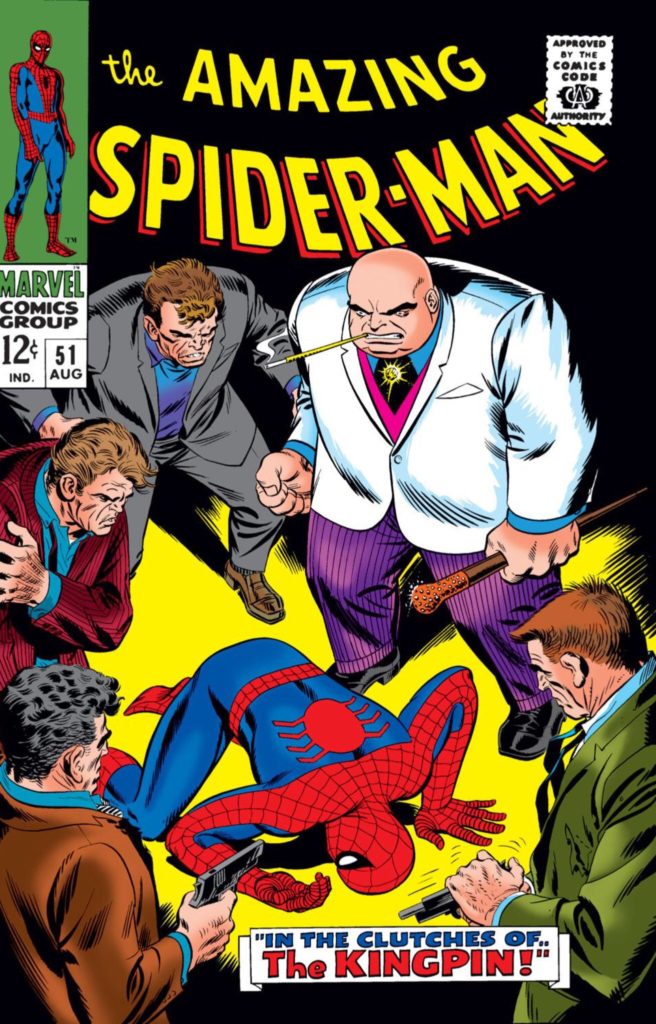

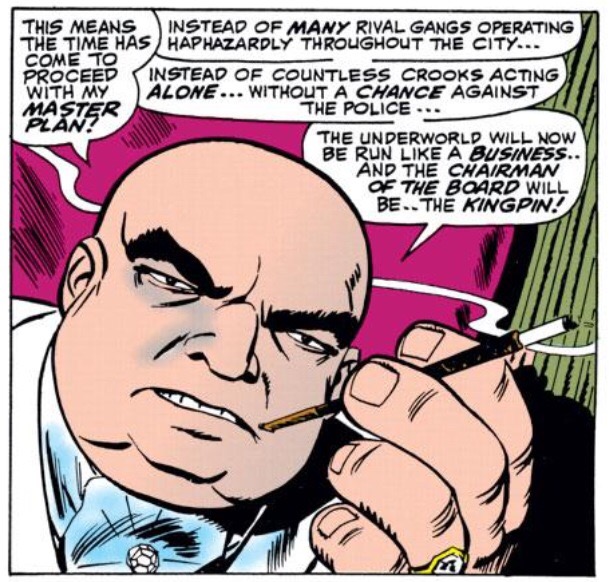
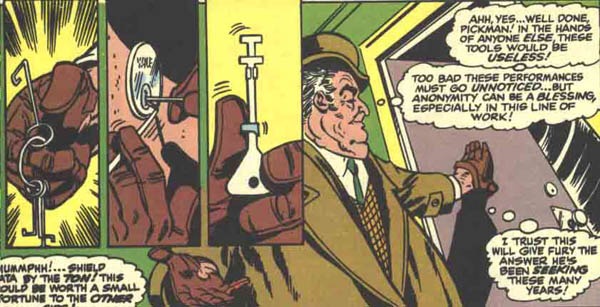
 The countdown to Portsmouth Comic Con 2024 is on
The countdown to Portsmouth Comic Con 2024 is on  Comic Creator Spotlight: A Visit to Commando artist Keith Burns studio
Comic Creator Spotlight: A Visit to Commando artist Keith Burns studio  Toys and Licensing – troubled times ahead as Brand Licensing Europe nears?
Toys and Licensing – troubled times ahead as Brand Licensing Europe nears?